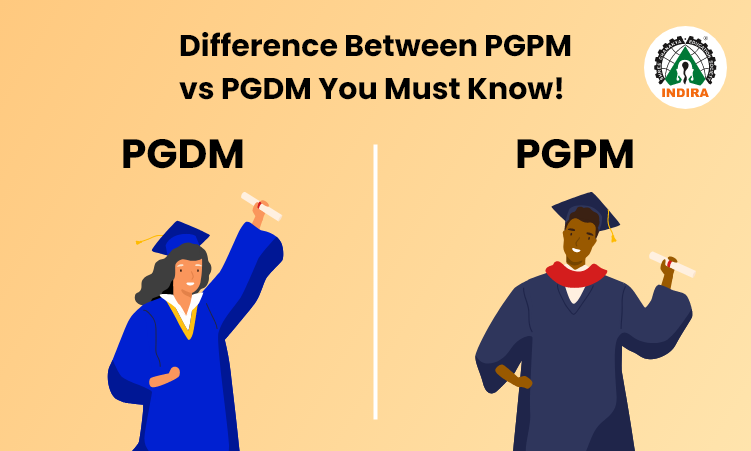Published on November 17, 2022 | Leave a response

Have you considered a career in management? The young aspirant will undoubtedly be weighing their alternatives because there are a wide range of options accessible with various curricula. The choice of where to apply is important as the admissions season is currently underway. The decision between management institutes, however, depends on a number of variables based on a person’s characteristics, objectives, and necessities. The next step is to navigate the maze of available MBA courses. However, one’s decision can be guided and narrowed down by clear logic and reasoning. We’ll look at the important distinctions and suggestions between two well-known MBA formats, PGDM (Post Graduate Diploma in Management) and PGPM (Post Graduate Programme in Management), to assist students decide what’s ideal for them.
In a 2-year, full-time programme, AICTE-recognized universities grant the diploma degree known as the PGDM (Post Graduate Diploma in Management). Business schools that provide PGDM programmes are independent organisations with industry-focused curricula, giving them the most flexibility to continuously update their course offerings in order to stay up with changes in the business world. Its educational standards are on par with those of students earning an MBA.
The Post Graduate Programme in Management (PGPM) is a certification programme rather than a degree programme. It is a common 1-2 year curriculum that has no endorsements because it is typically given by independent universities. The primary distinction is that PGDM programmes allow you to pursue advanced degrees like a Ph.D., whereas PGPM programmes do not.
In the preceding section, we covered the course overviews for both of these programmes. Let’s determine the differences based on certain parameters at particular levels. Here, we evaluate the two courses using a variety of indicators to determine their differences.
Course Qualifications
Here is how the two courses compare to one another in terms of course eligibility:
PGPM: To enrol in a PGPM course, a student must have passed an admission exam like the GMAT, CAT, CMAT, or XAT. The PGPM programme uses these entry exams as a gauge. The sort of exam differs depending on the institute, therefore it’s best to check the entrance exam for eligibility before preparing for one. Additionally, the course mandates that students pass a written test, a group discussion exercise, and interviews.
PGDM: In order to be admitted to the PGDM course, students must pass the CAT exams.
Given that it is a full-fledged master’s degree, applicants must complete and pass the CAT exam.
To ascertain their eligibility, individuals must also take a written exam, participate in a group discussion, and undergo additional interview exams.
Curriculum Here is a comparison scale based on the two courses’ curricula:
PGPM: The PGPM has a shorter curriculum than the PGDM because it only lasts one year.
To advance the pupils further, PGPM focuses on the current modern scenarios and practical skill set.
The course’s design incorporates a distinct viewpoint and is strongly infused with practical experience. Financial Accounting and Reporting, Corporate and Management Finance, International Finance, Corporate Law and Business Laws, Ethics in Business Environment, and Data Visualization are some of the topics that are heavily stressed in this course.
PGDM: The two-year PGDM programme is a full-fledged course. As a result, the course’s basic coverage is substantially more than that of the PGPM course. Four semesters of six months each comprise the course framework. These first three semesters concentrate on providing students with a thorough education, while the fourth semester emphasises hands-on experience. Finance, Marketing, Business Marketing, Operations Management, Human Resource Management, Information Systems and Management, Strategic Management, Data Analysis, and other topics are among the most important course topics for students.
Knowledge and Skill Set
This section examines the comparison based on learning exposure and skill set:
PGPM: The goal of this course is to help students gain leadership skills and practical knowledge. This course can be used in conjunction with your current practical experience to advance your career.
PGDM: The goal of the PGDM programme is to give students the information and abilities necessary to function as managers. Students can learn from it and use it to prepare for various imminent management scenarios and instances. Additionally, it enables children to be informed of current events and to adopt the proper attitude and behaviour to deal with them.
Future Plans
The future scope for each of these courses is as follows:
PGPM: Recently, this course has gained popularity and moved up the list of top choices. Students and working professionals who wish to advance their professions are taking the course in increasing numbers. Additionally, it has developed into a viable alternative for students who are unable to enrol in full-fledged MBA programmes. Particularly the industry has acknowledged the course’s potential and is eager to give graduates with this degree valuable working experience. The candidates are probably going to work in corporate settings, at managerial levels, and in fields like management and finance, among others.
PGDM: Because of the course, PGDM has a significantly wider level of scope than PGPM. This receives more exposure because it’s a legitimate course rather than a certificate-level course. Students who earn PGDM degrees are likely to work as business consultants, financial managers, administrative managers, public relations managers, marketing executives, and other related positions. They are most likely to enter the financial, MNC, PSU, and other industries.
While PGDM and PGPM programmes both seek to assist applicants in developing a successful career in the managerial field, there are too many distinctions between them to compare directly. The type of applicant primarily differs.
Analyze your position in order to choose the best line of action. For instance, getting a PGDM is the best course of action if you are fresh to the corporate sector. Similar to this, professionals who have already begun their careers and are seeking to improve their skill sets in order to develop their careers might think about finishing the PGPM course.
Posted in: PGDM (AICTE Approved) Admission 2020


Which is Better: MBA or PGDM for Government Jobs?
Published on March 25, 2021
IS PGDM EQUIVALENT TO MBA DEGREE? HOW TO CHOOSE A COURSE?
Published on January 16, 2021
PGDM in Marketing: Career, Jobs, Syllabus, Scope, and Salary
Published on February 24, 2021
WHAT ARE THE CAREER OPPORTUNITIES AFTER PGDM? JOBS AFTER PGDM
Published on January 20, 2021
MBA or PGDM? Which course should you choose?
Published on January 6, 2020